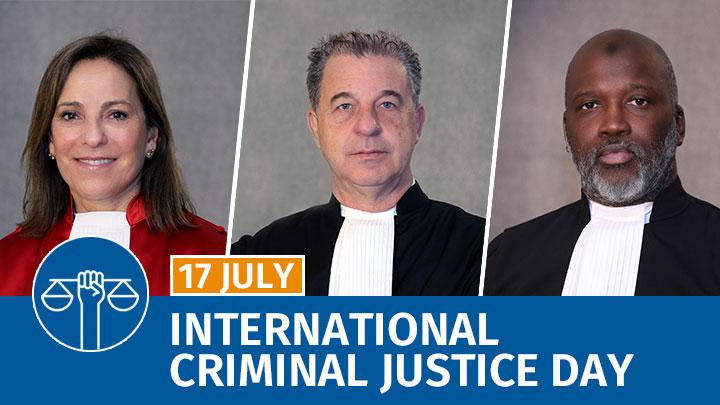IRMCT Principals mark the Day of International Criminal Justice, 17 July 2023

On the occasion of the Day of International Criminal Justice, the Principals of the International Residual Mechanism for Criminal Tribunals (Mechanism), President Graciela Gatti Santana, Prosecutor Serge Brammertz and Registrar Abubacarr M. Tambadou, issued the following statement:
“On the anniversary of the adoption of the Rome Statute, we join together with the international community to reflect on the valuable contributions made by international courts and tribunals towards ensuring accountability and upholding the rule of law.
Thirty years ago, in the midst of reports of widespread and flagrant violations of international humanitarian law occurring within the territory of the former Yugoslavia, the Security Council unanimously adopted resolution 827, creating the United Nation’s first international criminal tribunal -the International Criminal Tribunal for the former Yugoslavia (ICTY). The International Criminal Tribunal for Rwanda (ICTR) was created the following year. These ad hoc Tribunals paved the way for the establishment of the world’s first permanent court to adjudicate international crimes, the International Criminal Court, twenty-five years ago today.
In addition to marking ten years since its branch in The Hague became operational, 2023 has already been a year of important achievements for the Mechanism. On 31 May 2023, the Appeals Chamber delivered its Judgement in the Stanišić and Simatović case, signifying the end of the Mechanism’s adjudication of core crimes cases related to the former Yugoslavia. Earlier that month, Fulgence Kayishema, one of the four remaining fugitives indicted by the ICTR was arrested in South Africa.
As the Mechanism’s Principals, we are immensely proud of these achievements and the progress that has been made in the last decade. The headlines regarding our accomplishments may attract the world’s attention for a few days, but years of patient work were needed to bring them to fruition. We know first-hand the enormous efforts of our staff and judges that have gone into attaining our goals and in creating a judicial record for present and future generations. We are inspired in our work by the strength and perseverance of the many survivors and other witnesses who have contributed to our investigations and judicial proceedings, as well as our many valued partners in the affected communities. We also owe an enormous debt of gratitude to those States that have supported us not only in word, but also through concrete action and cooperation.
Looking to the future, we remain firmly committed to guiding the Mechanism in the fulfilment of its critical mandate. As the Mechanism enters a new phase in its life-cycle, concentrated on its long-term functions, our efforts will continue to shift towards sharing our legacy—including the lessons learned from the ICTY and ICTR—with the affected regions and the international community.
In doing so, we cannot ignore the daily atrocities that continue to be perpetrated in conflicts around the globe. Each of us has dedicated our professional lives to the pursuit of justice in the hopes of ending such violence committed in contravention of international law. This candid acknowledgement that more must be done should not, however, be mistaken for pessimism. We have continued faith in the international community, which has previously united in the bleakest of times to recognise and protect the inherent dignity and equality of all human beings. Our institution stands as proof that international criminal justice efforts can significantly contribute to a peaceful future.
In closing, let us take today, the Day of International Criminal Justice, to recognise that our collective efforts must persist. As individuals, as leaders of the Mechanism, and as members of the international community, we remain steadfast in our commitment to the promise of international criminal justice.”